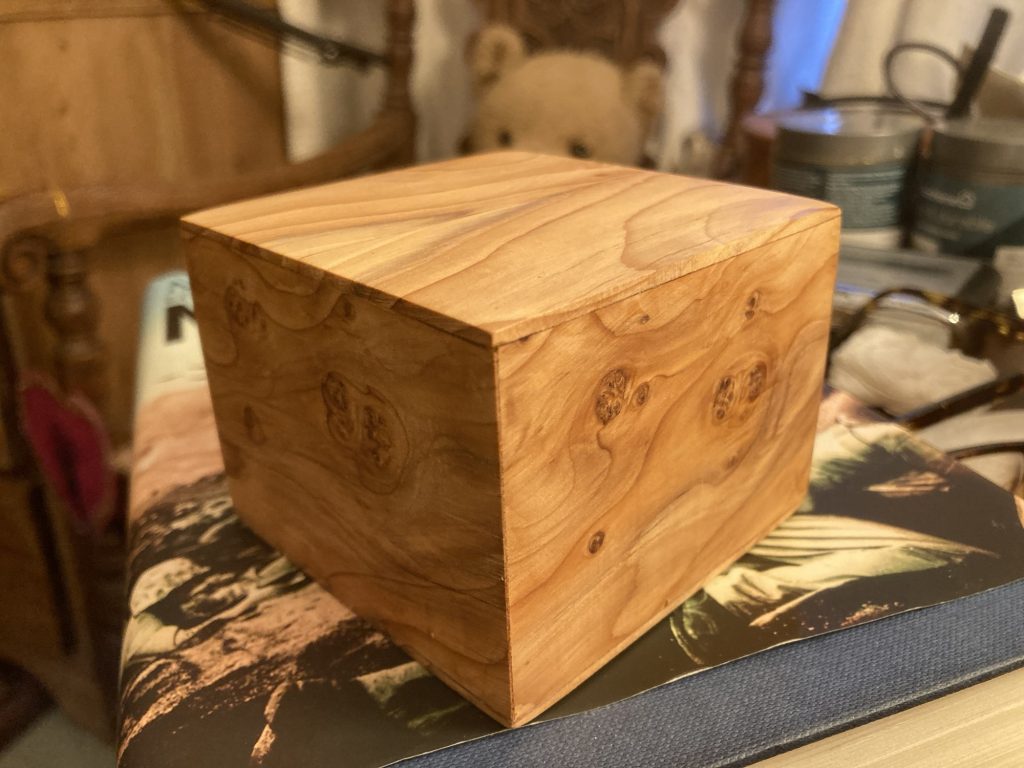
Thought I’d let the natural beauty of this wood shine. So, in a change from the herringbone obsession, Yew Burl. WIP.

renaissance man

Thought I’d let the natural beauty of this wood shine. So, in a change from the herringbone obsession, Yew Burl. WIP.
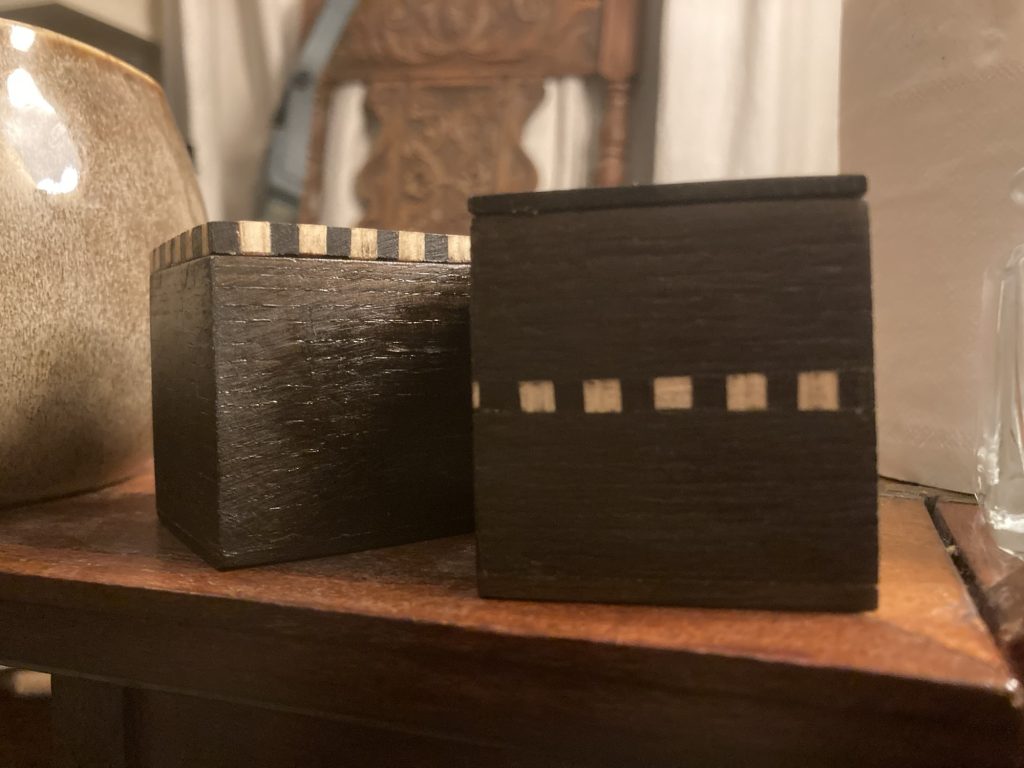
I’ve long loved bog-oak. And finally I’ve made a few things using it. These latest little ones are really quite tiny.
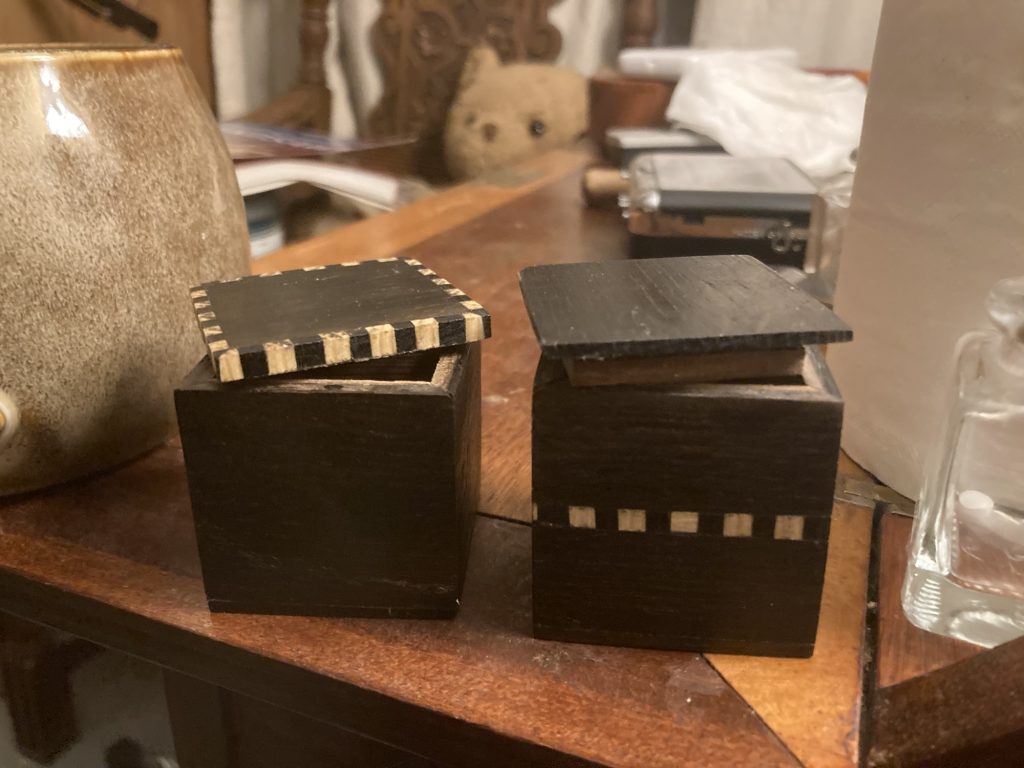
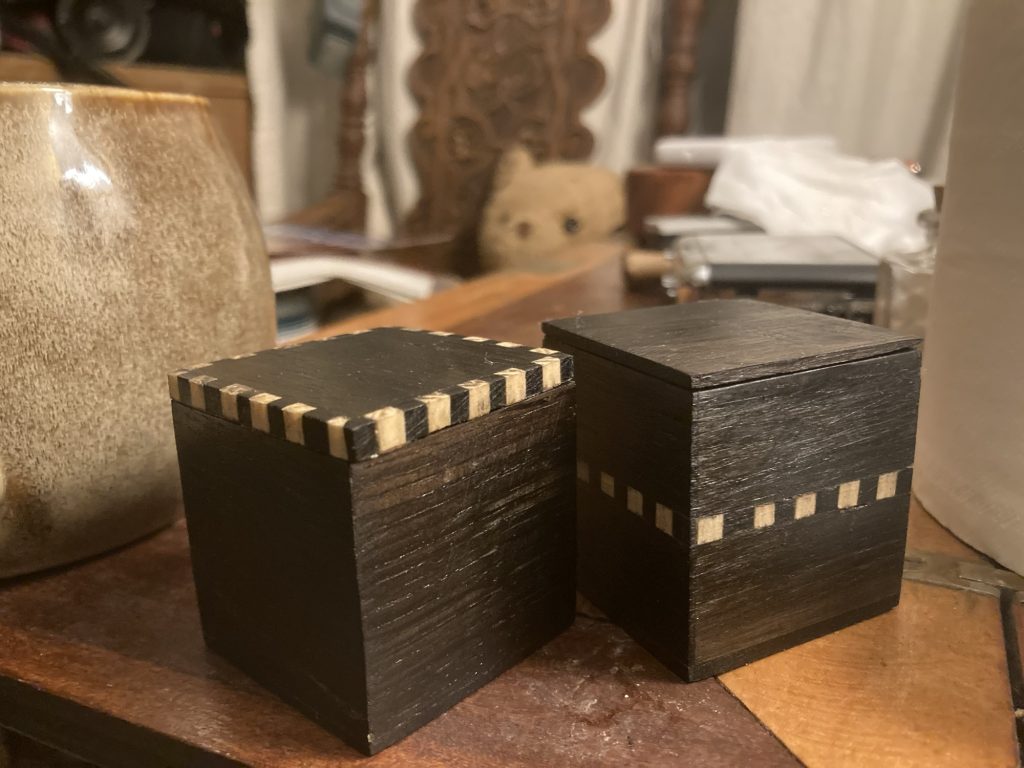
The effort involved in producing these, if it lead to me pricing the results by hours spent? Well, these tiny wee boxes would be pretty damn expensive!
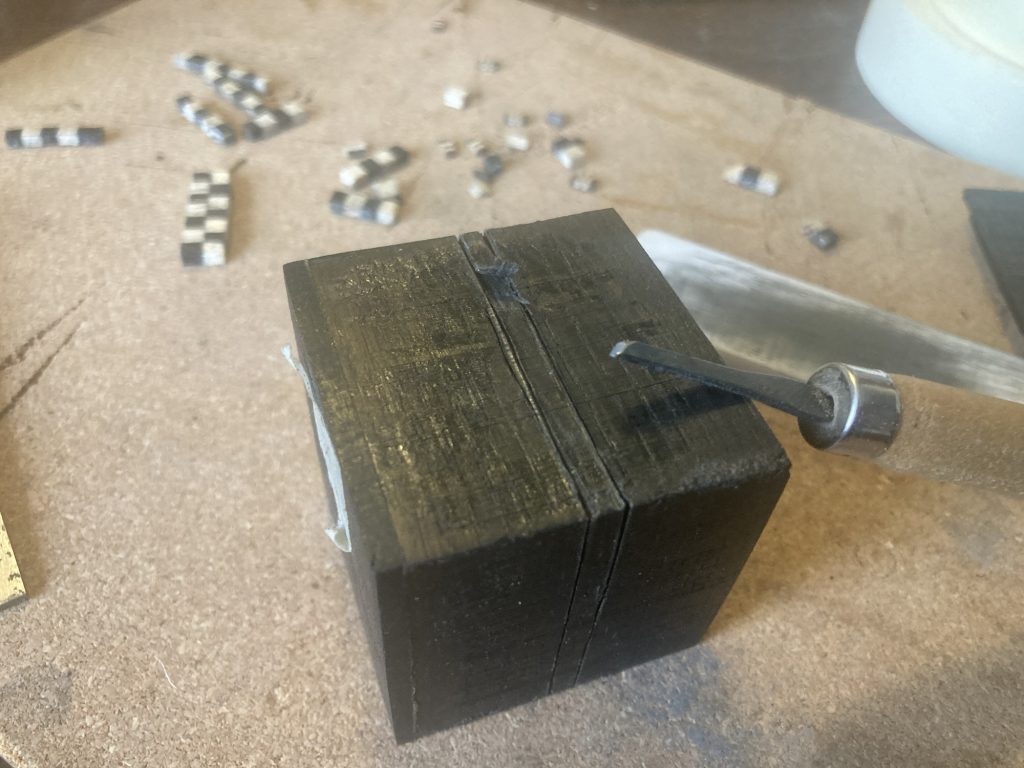

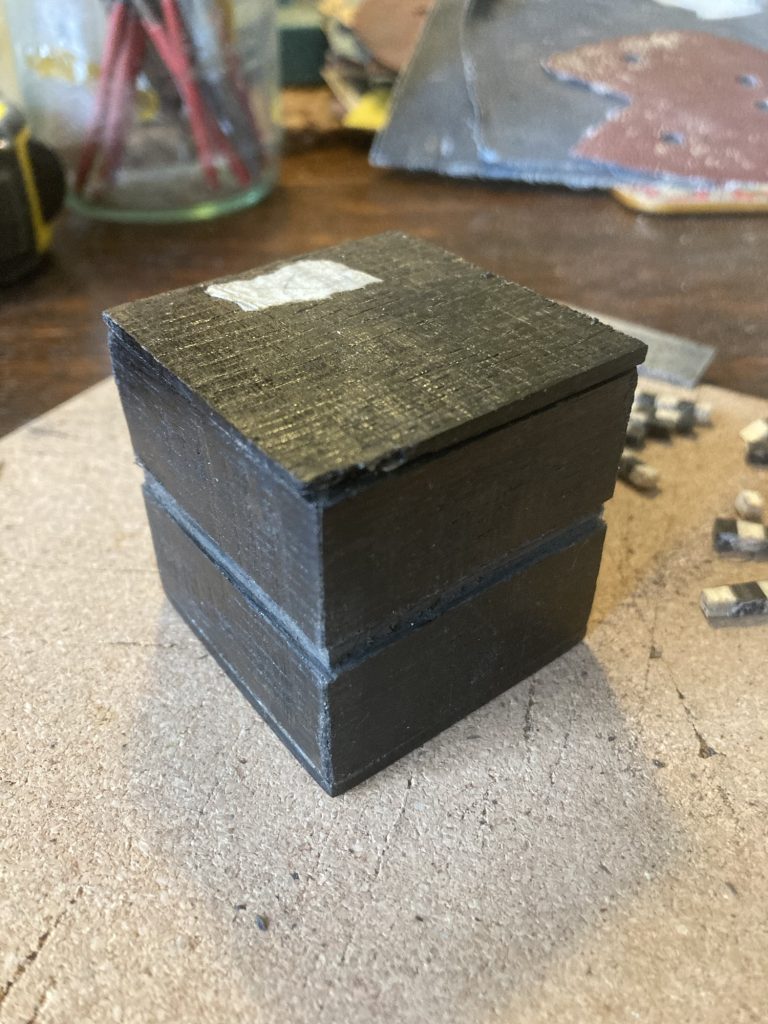
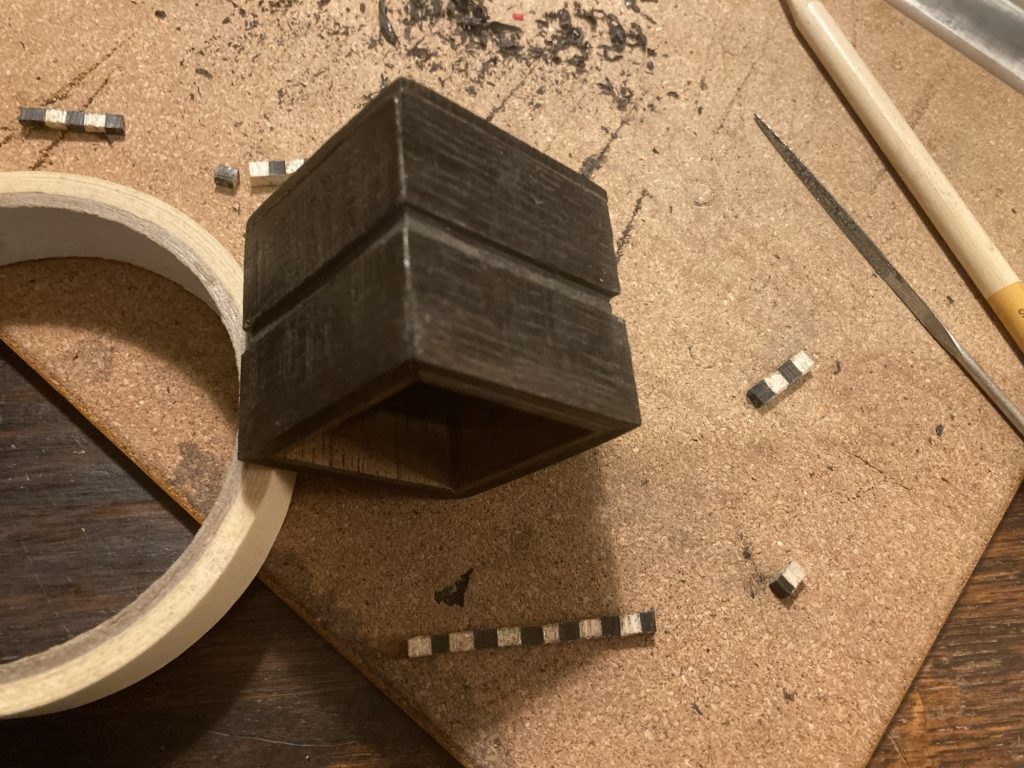
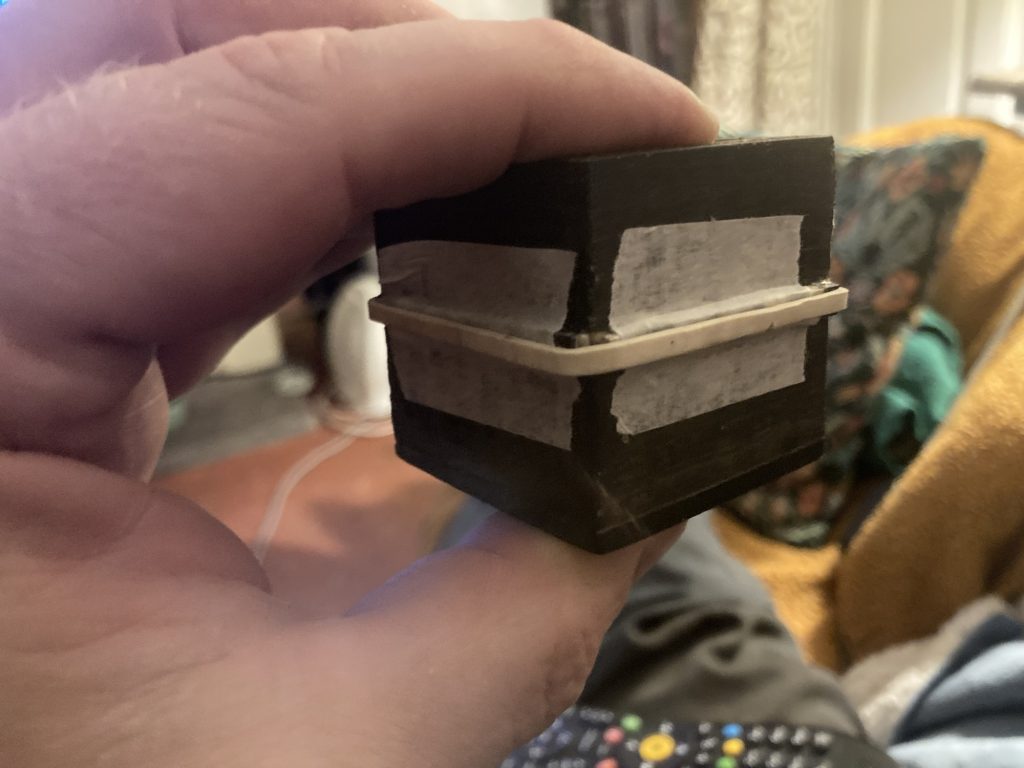
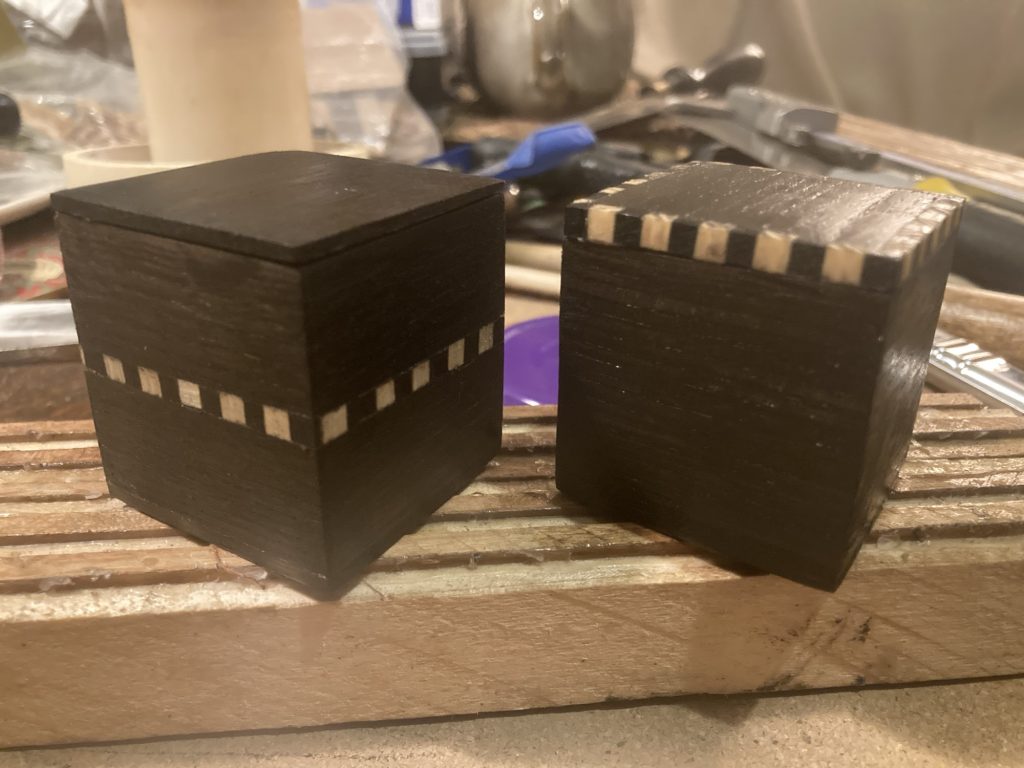

I’ve been really getting into my box making. And, to my surprise and delight, they’re proving quite popular.
I initially made this one, for a pack of standard sized playing cards:






A pal at Shedders, Walter, liked it so much he commissioned one as a Xmas gift for his daughter. My first commission/sale!



More recently our pal Patrick has asked me to make him a plectrum box, in this style. I did that immediately upon his ‘commissioning’ me. I’m really chuffed with the results.

So that’s now two commissions/sales! And, amazingly, I have two more in the pipeline. The first two were guys: Walter and Pat. The second are gals: Ali and Sadie!
I’ve been using up the remainders and off-cuts from previous box making projects in the last few days, to make a few smaller boxes, some quite like Pat’s plectrum box. Others a bit different.

In this latter category are my first boxes using more of my much beloved bog oak. This stuff – for which I must thank fellow Shedder Clem – is quite interesting, different, and indeed harder to work with.
*As the keen eyed may spot, this little ‘un has several key changes in design: the herringbones are oriented horizontally, not vertically (more like road sign chevrons); the lid and base are ‘butt jointed’, or aligned horizontally.
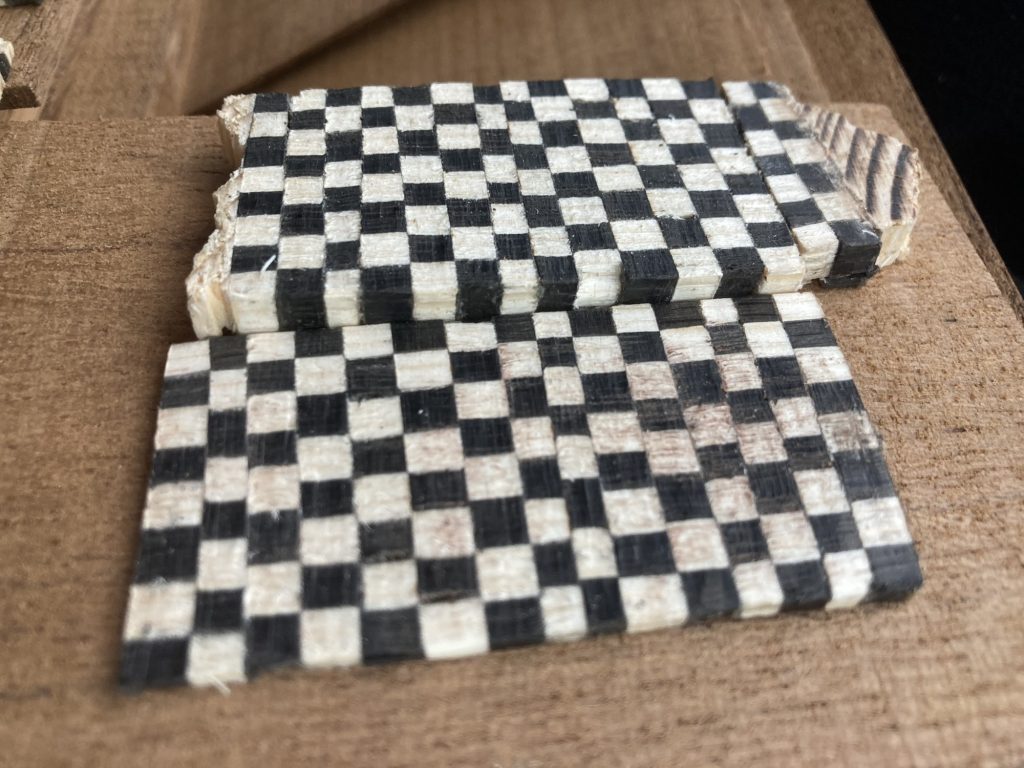
It’s time I did something with this stuff. It was just an experiment. But I kind of like it. It’s also the first thing I’ve made using bog-oak, a timber I’ve been wanting to use for aeons.
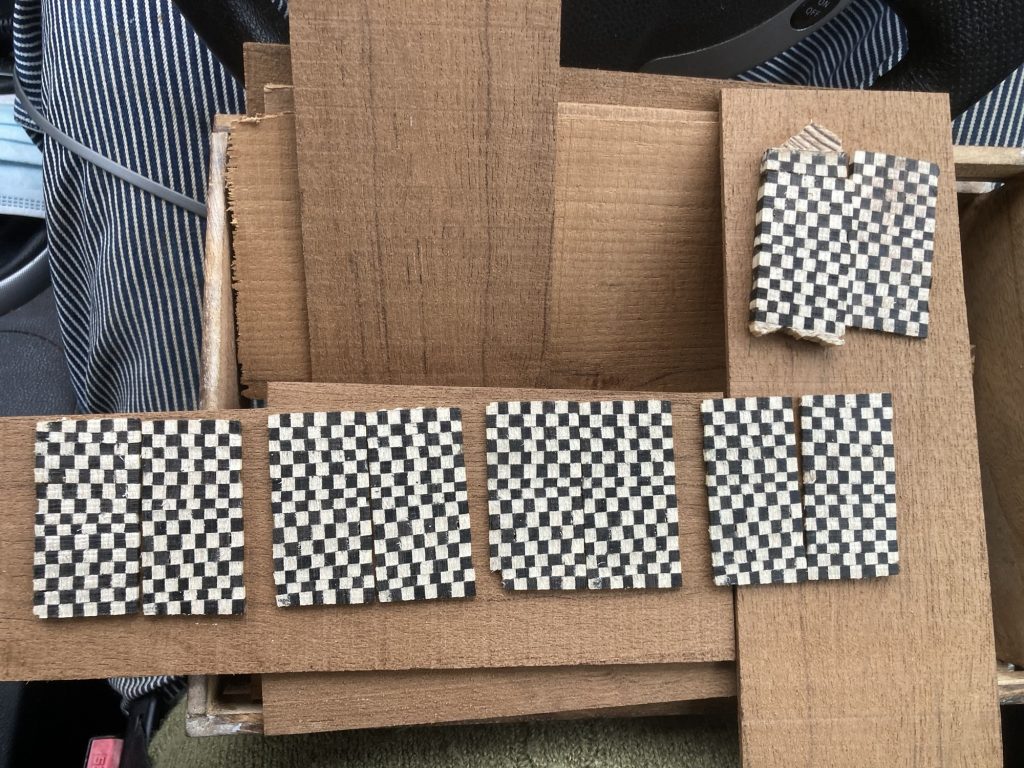
Laying out the bits I have, as pictured above, gave me an idea. I’ve got enough of this pattern to make a small near square box. With the pattern on all faces except the bottom. That’s fine.
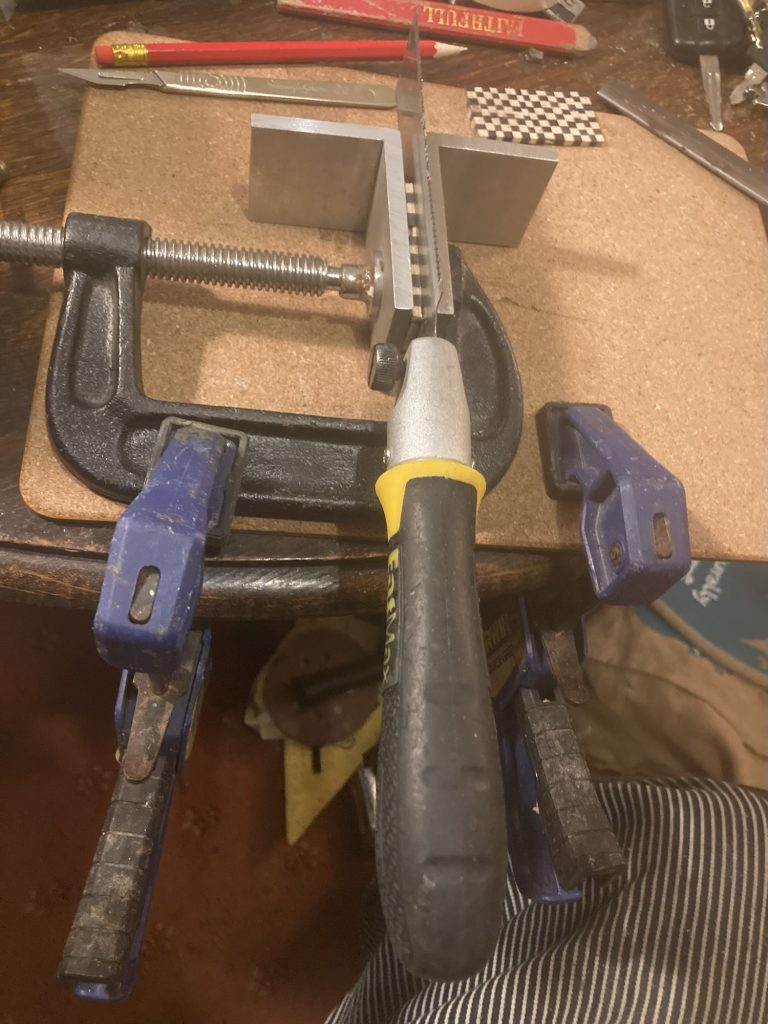
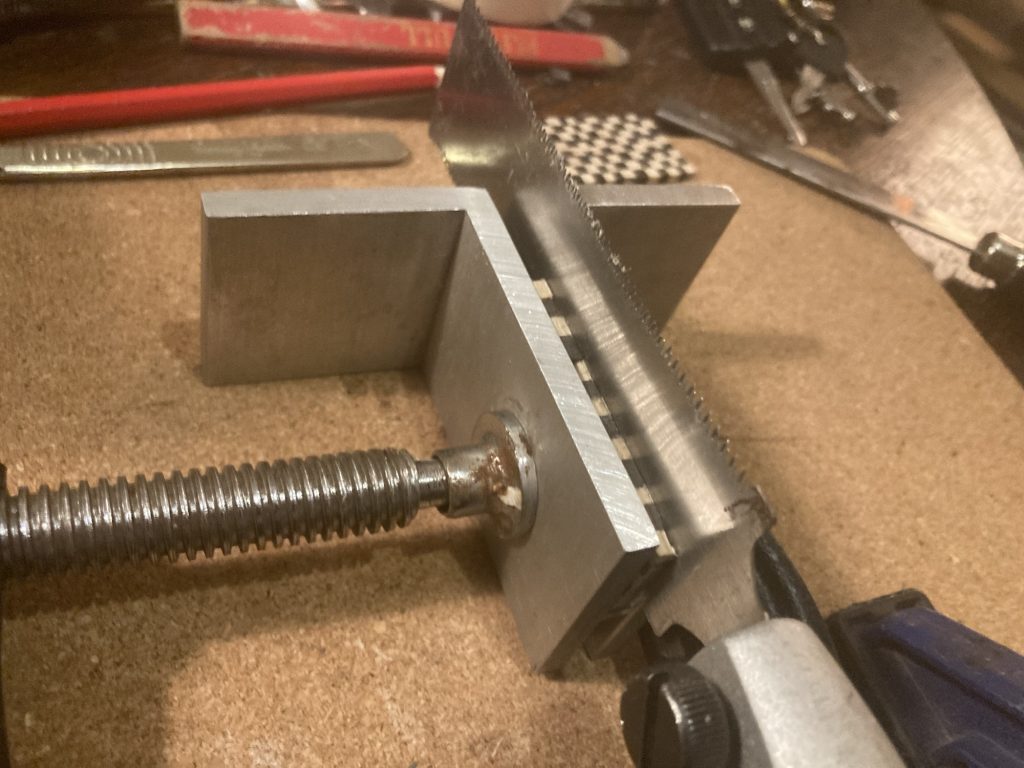
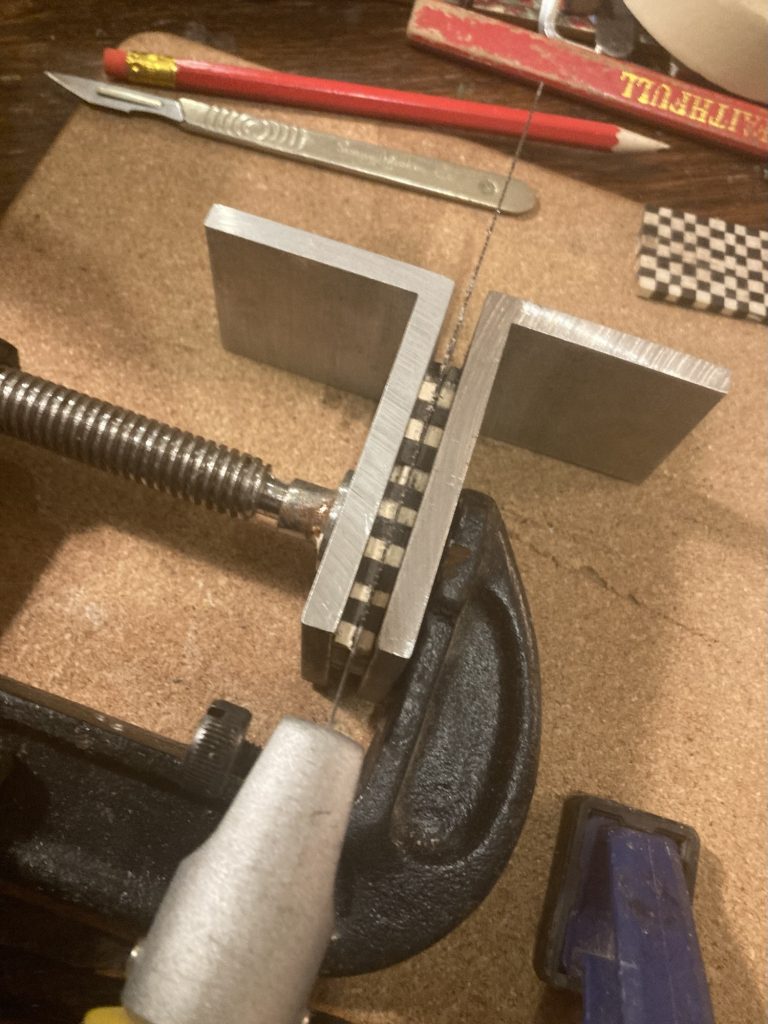
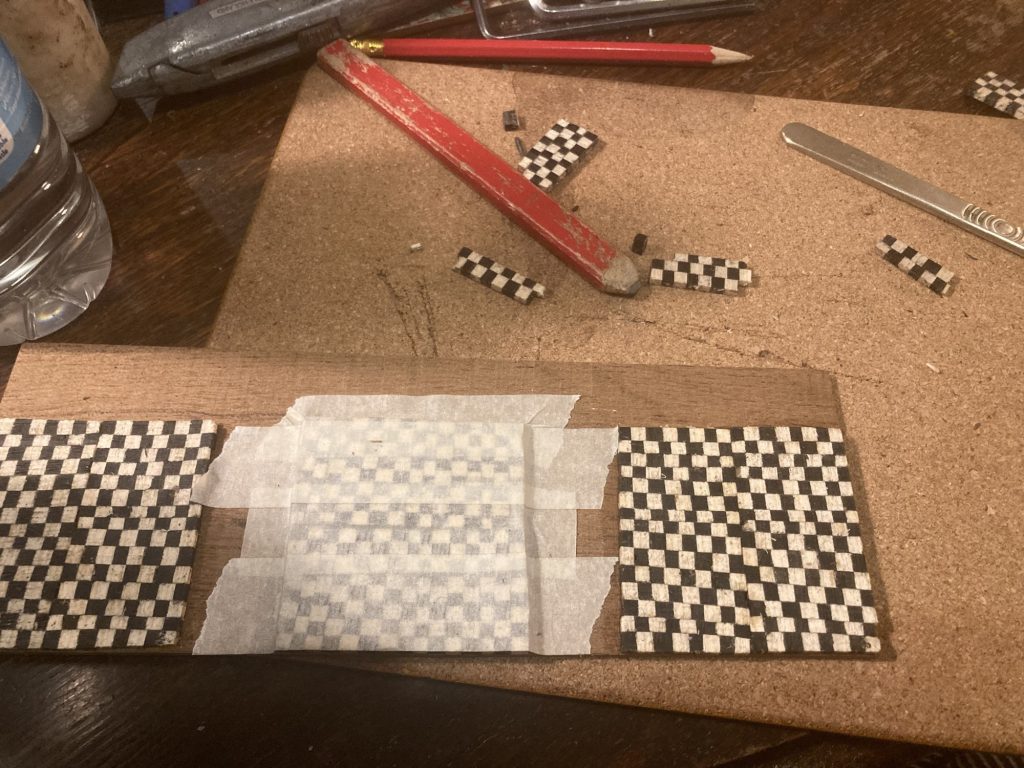
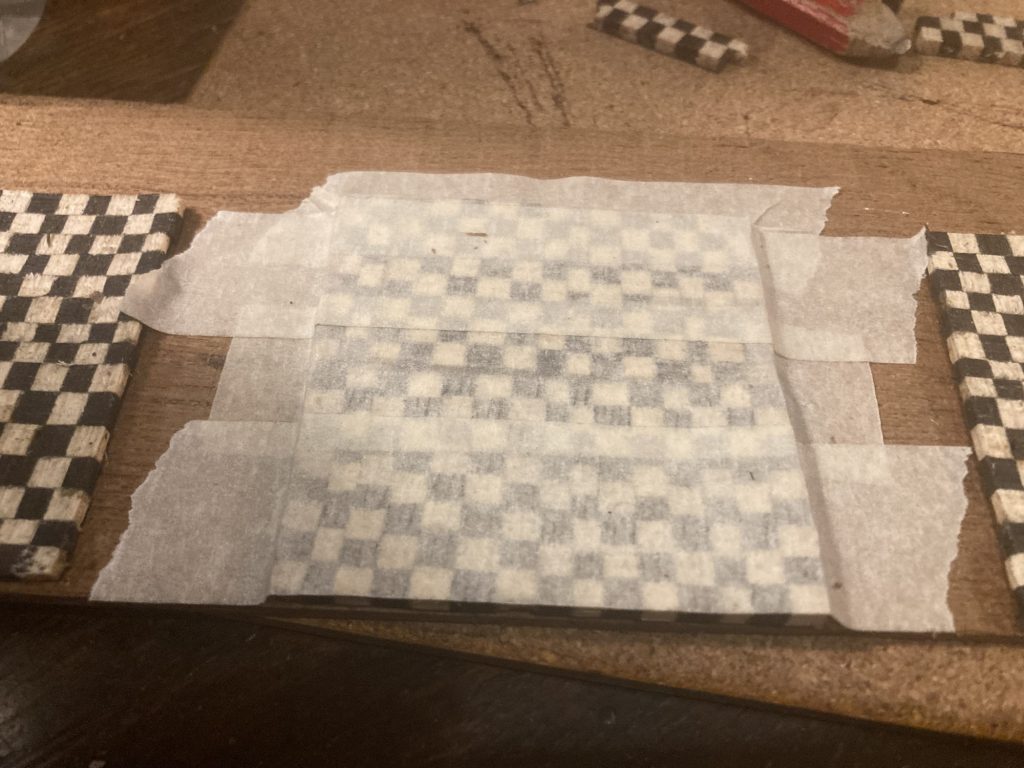
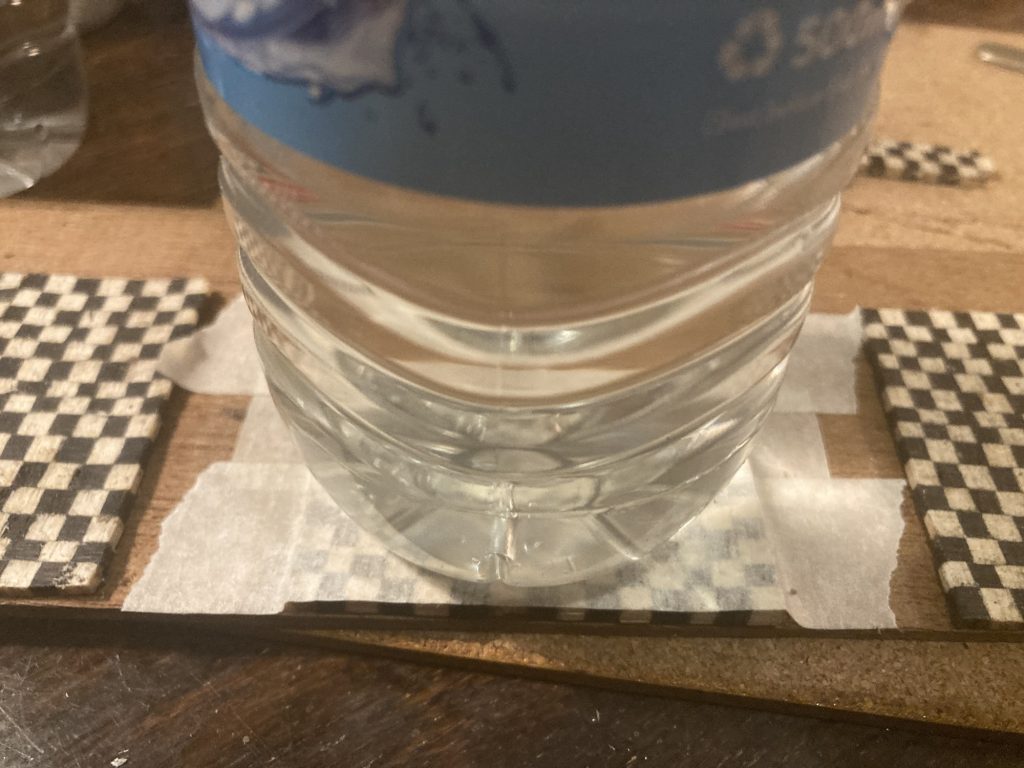
The eagle-eyed may spot that one slice was considerably thicker than the others. So I set up a jig – see above – to allow me to slice it in two.
In total I now have five, roughly square, pieces of this pattern. Each made from two smaller rectangles, glued (onto new veneer backers) side by side.
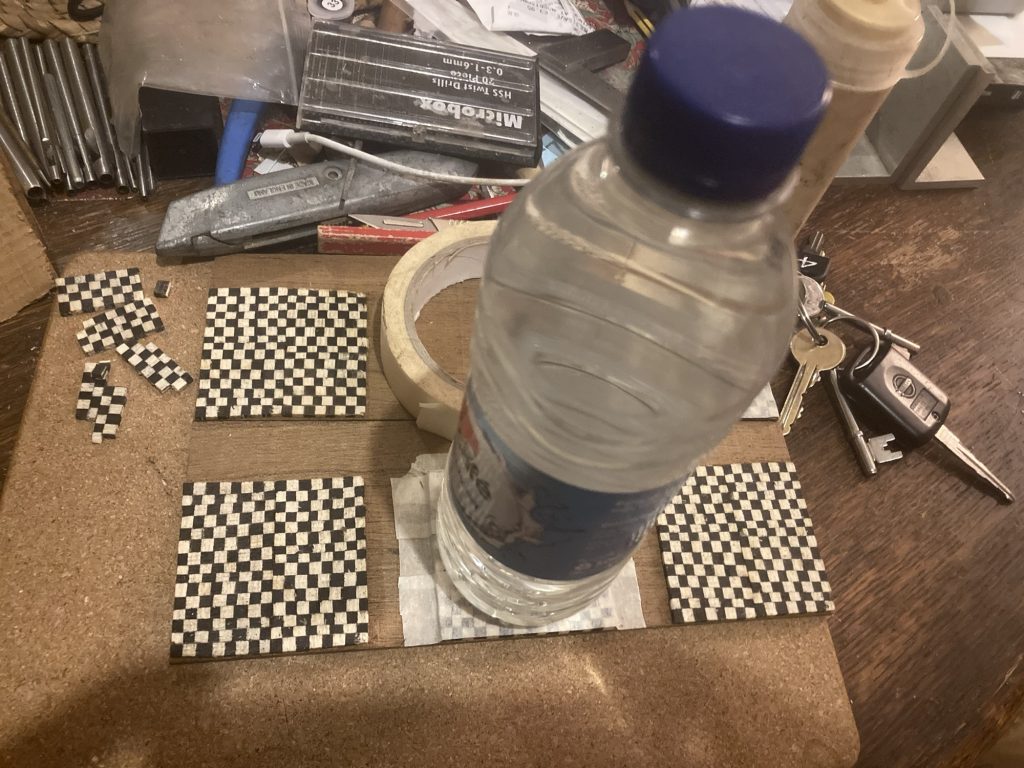
There were a few missing bits, here and there. Particularly in the fifth and final piece. So I got bits from the leftovers, and filled in any gaps. and plopped a bottle over the final section, to keep it down a the glue sets.
I’d like to do a much better neater and more accurate version of this pattern, some time soon. But the kooky irregularity of this lot is, I think, its charm.
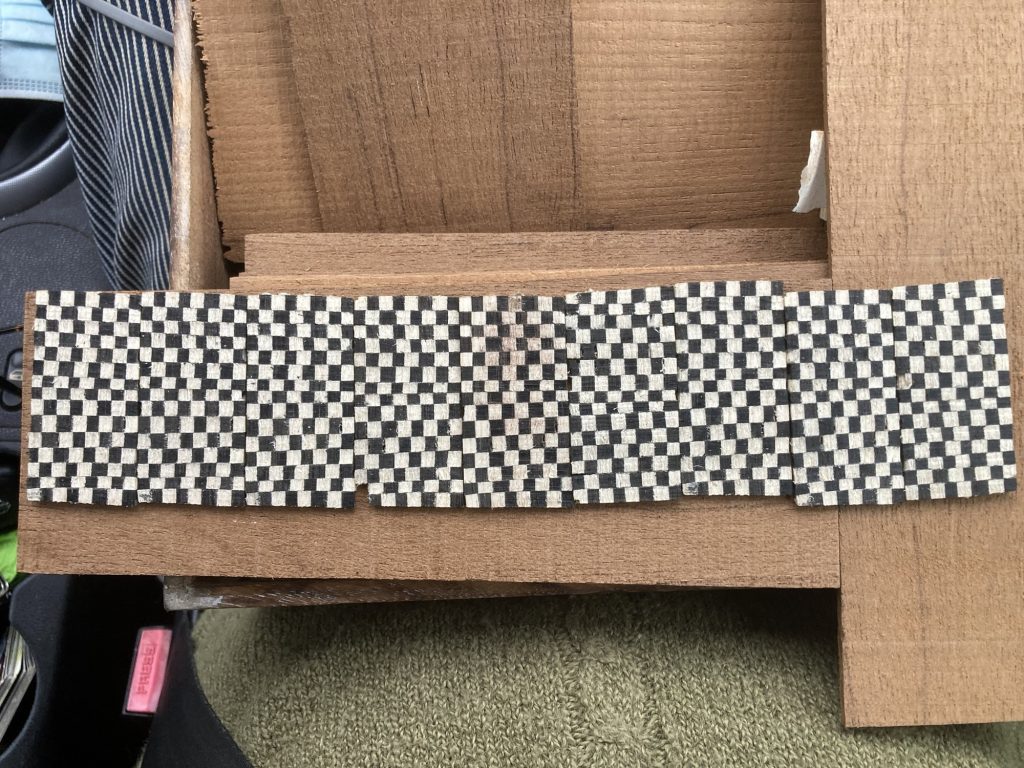
The above images show a different pattern I recently tried out, using bog-oak and plain pine. Today I also cut a whole load of plain single-wood veneers.


This wood – I don’t know what timber it is – is for gluing to the back of the patterned veneers. To strengthen them. And to give an appropriate thickness for box building.
I also restored a couple of tools for Shedders. We’ve just been given a boxful of stuff. Much of it needing cleaning/restoration. I was basically getting rid of rust.
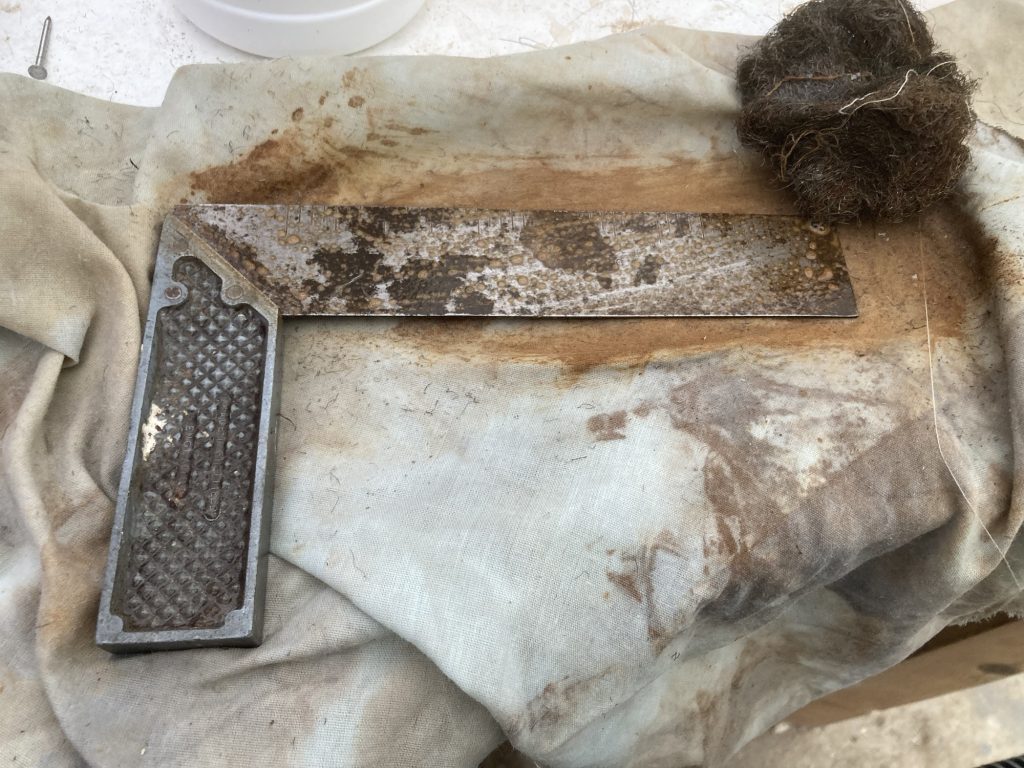

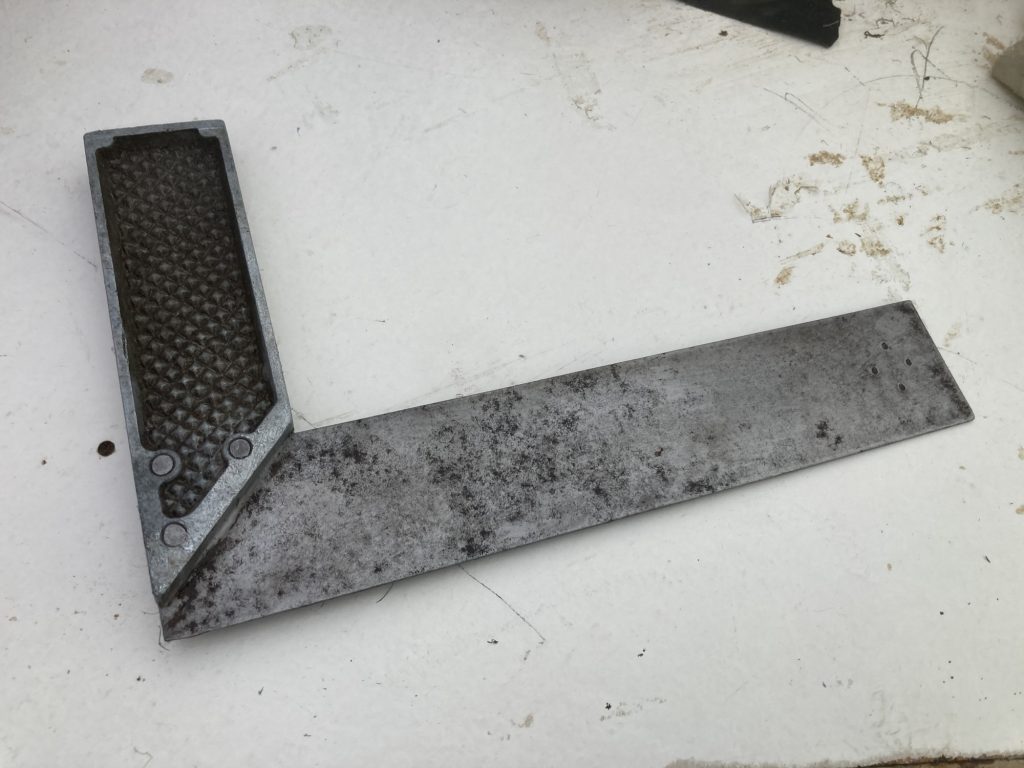
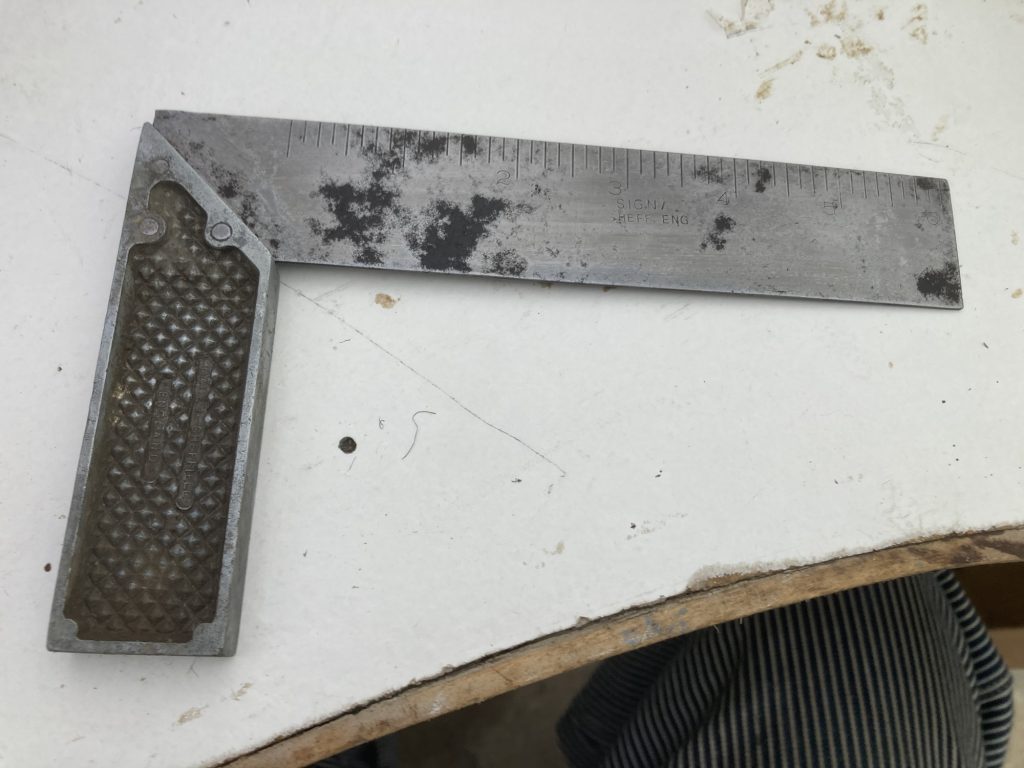
Also did a saw:
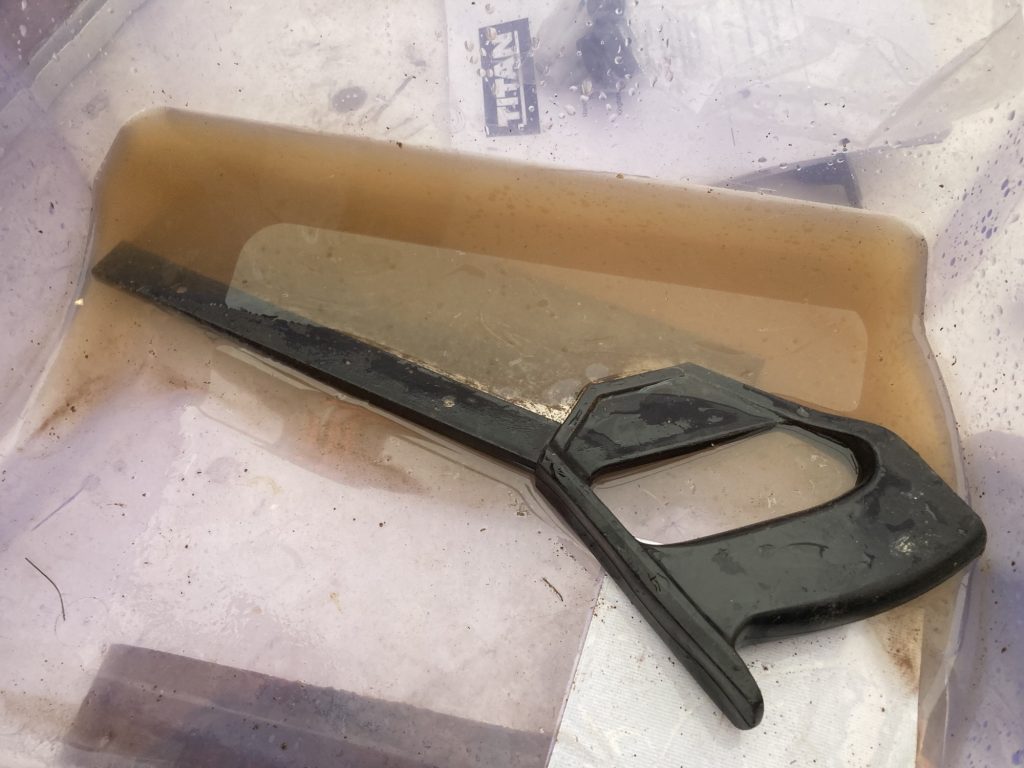

Incredible mosses, in a planter at The Secret Garden.





















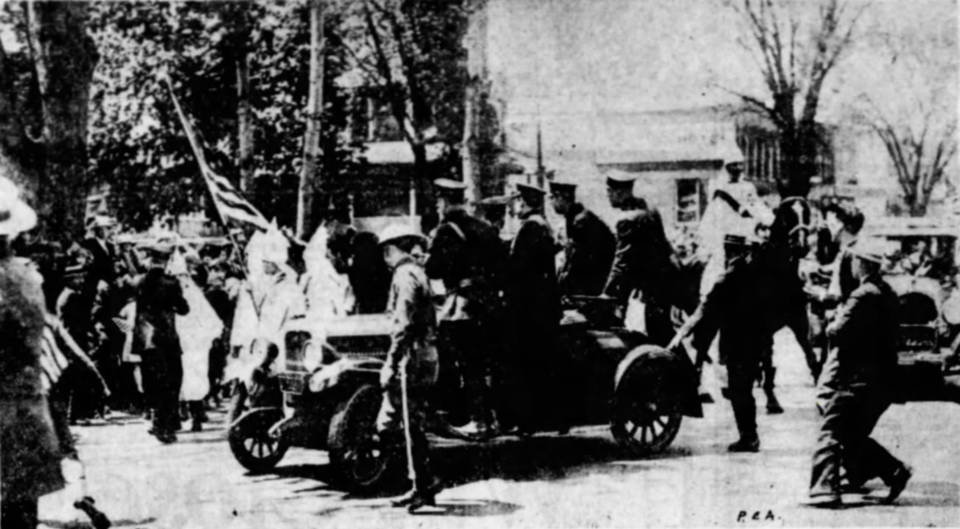
The above photo was taken at an event at which Donald Trump’s German grandfather – Friedrich ‘Fred’ Trump – was arrested, for ‘refusing to disperse’, whilst attending a KKK rally, in Queens, NY, 1927.
Grandfather Trump’s son, also Fred Trump, was a chip off the old block, being sued by NY authorities over his racist treatment of black tenants, as a NY landlord.
And now we have Donald, pursuing openly and avowedly racist goals, as POTUS. He repeats lies about crime and immigration that pretty much all studies of the actual subject categorically refute.
pic
I’ve read online that there are those saying boycotting the US hosting the World Cup is dumb and hypocritical. After all, we didn’t boycott the World Cup when Saudi held it.
Well, there is a valid pint to be addressed here. But my conclusion is totally different. Just because a crime was committed, but you failed to report it, act on it, or prose it it, doesn’t mean that, by logical extension and former precedent you are duty bound to never report further future crimes. That way lies madness, and the collapse of civilisation.
Okay, the works at large failed to exercise proper ethical and political judgment on numerous occasions in history, such as Germany hosting the 1933 Olympics, or… well, there are plenty of other potential examples.
So, following (?)’s ‘logic’, we simply throw out hands up, roll-over, and key dictators and other tyrants continue fucking everyone they fancy over? Er… NO! Maybe we could and should learn from our past mistakes.
Pic
Having said this, what is the best way to respond? I think boycotting the World Cup is a no-briber, personally. FIFA very foolishly gave DT a fake peace prize recently. They’ve earned a massive slap, for that alone.
But I don’t think we should be aiming to destroy the US economy, by selling all our US bonds/stocks, etc. In almost all conflicts between states/nations, it’s the little folk who pay dearest. That’s another mistake we need to stop making.
This awful scenario is the work of so called elites. The rich and powerful of disaster capitalism. Those who profit from the ruthless and systematic exploitation of others. They should be made to suffer, not Joe Public.
Well, not all of Joe Public. The MAGA segment really needs education and enlightenment, and maybe some punishment.
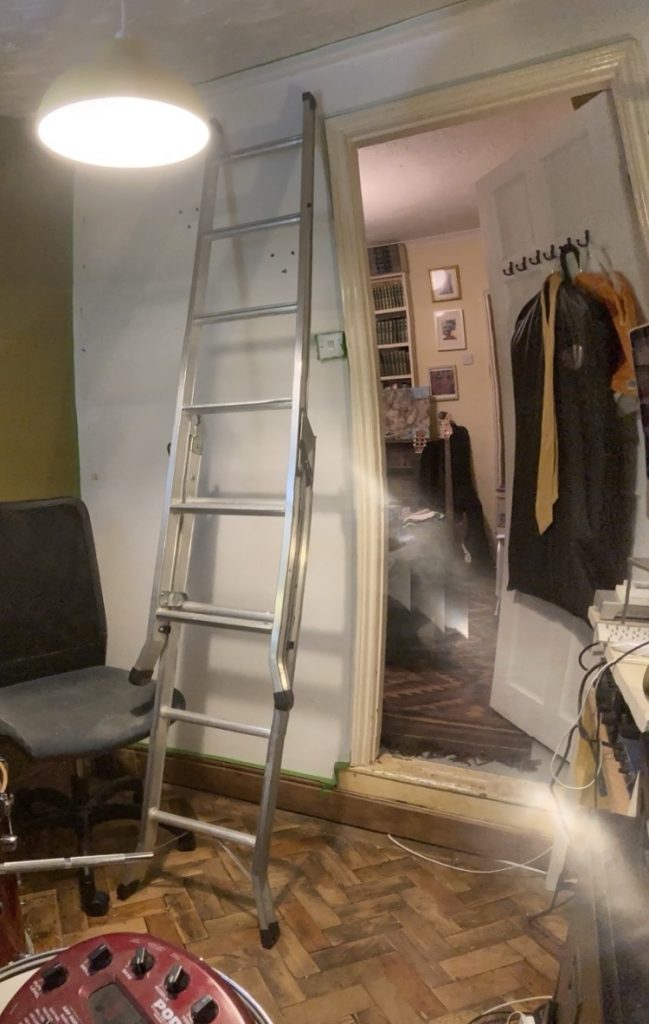
So, today I cleared loads of stuff from the drum room/office, and prepped for painting a third wall. Quite a while back I’d painted two walls in a rich hue. But, rather idiotically, I’d forgotten to jot down the Valspar colour name.
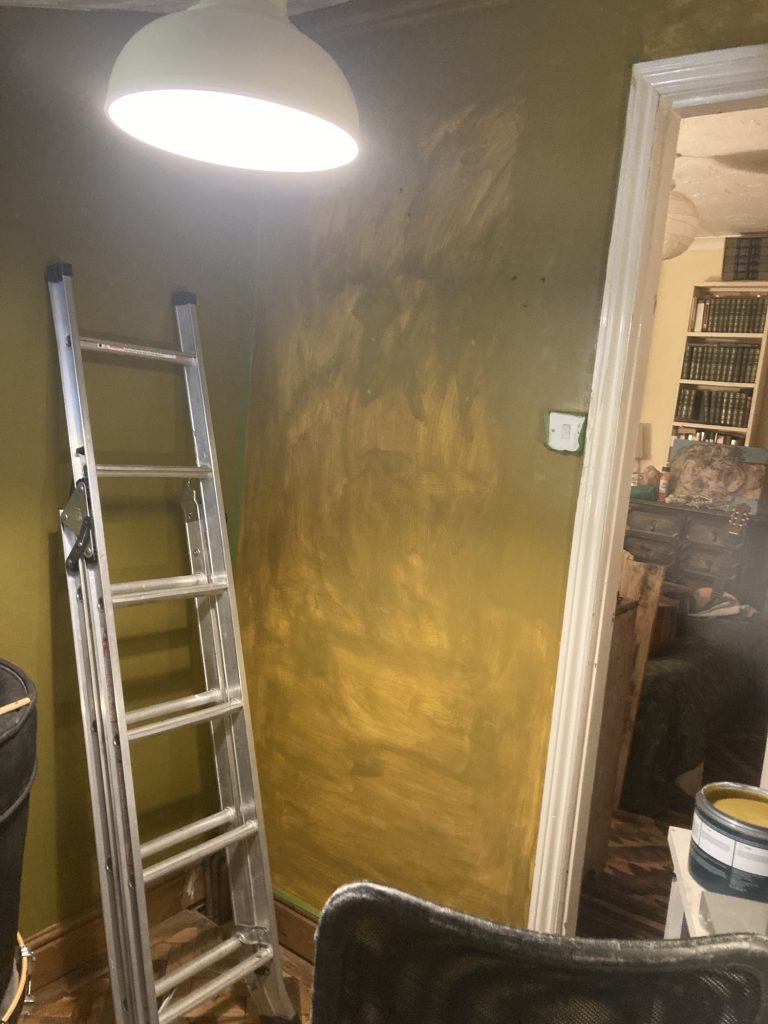

Today’s first coat was done with a 25ml sampler pot, using Valspar French Mustard(!). I’d had to guess at the colour. But luckily, during a trip to Wisbech B&Q, I spotted the little sample swatch I thought I’d used previously. And it turned out to be a correct match. Phew!
After one coat, and having determined I’d chosen the matching colour, I popped back to B&Q for a 2.5l pot.
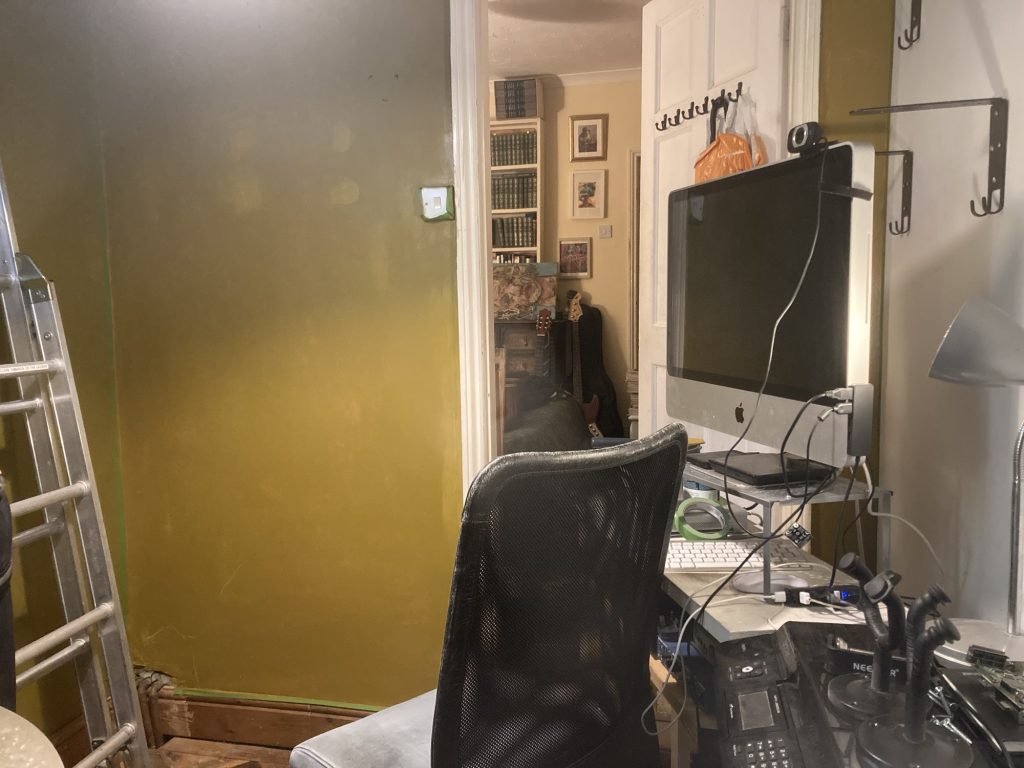
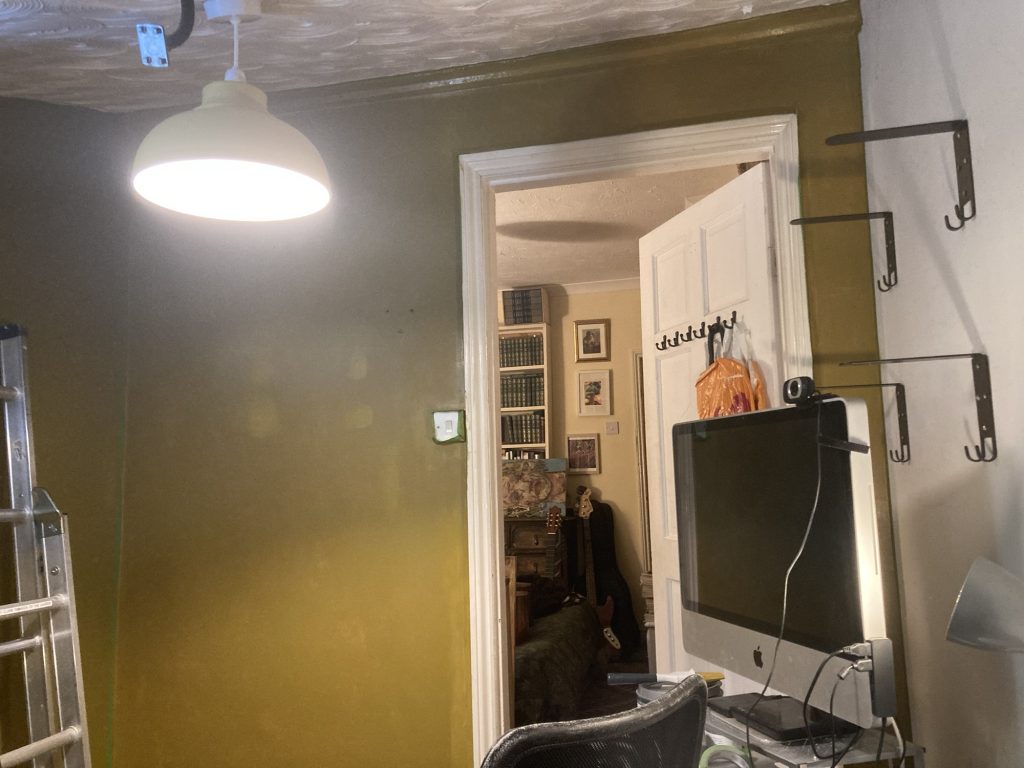
A second coat was definitely required. In places, a third will be needed.
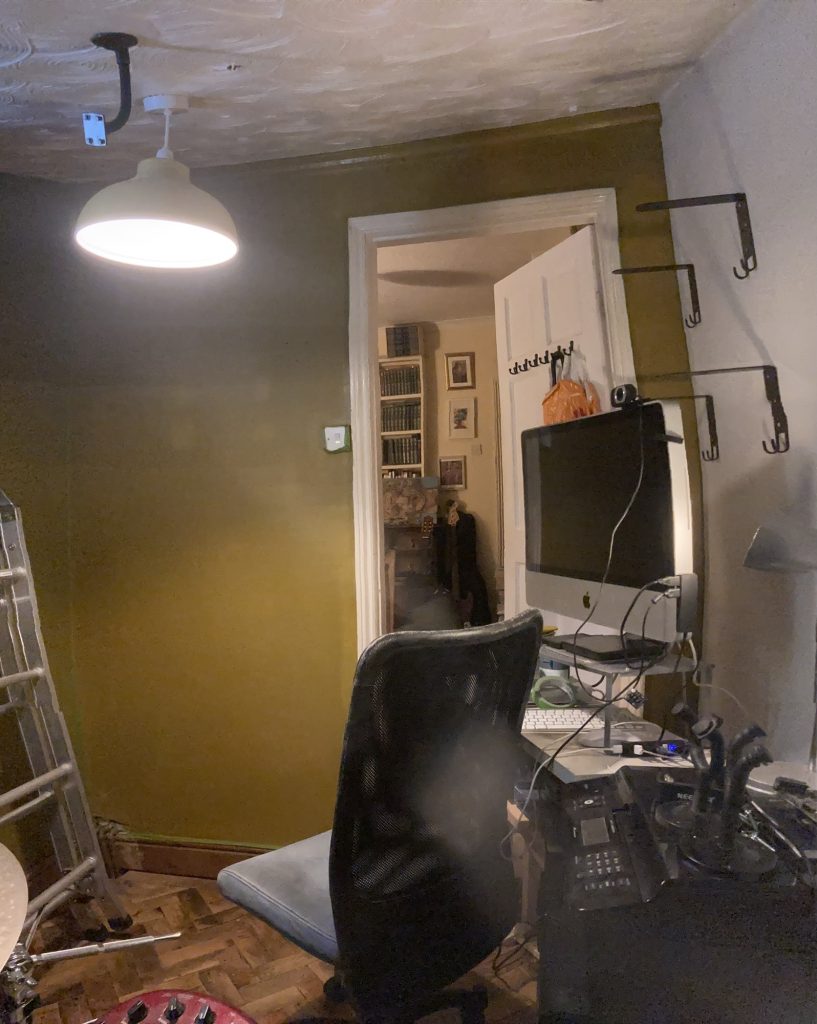
I absolutely love this colour! Once this wall is done, I will prob complete one of the other walls; the wall with the window looking out into the back garden was only partially painted previously.
For now I’ll leave one wall white. If I didn’t, I think this already tiny room might feel even tinier.
I want a beautiful rug for the floor. The kit will sit on that. I wonder how I might a) afford the rug, and b) protect it from the drums and hardware.

Donnie desperately wants adulation. Boy, does he ever get it. And, boy oh boy, does he know how to get it. Amongst many other other things for which he earnestly craves adulation, he wants to be adored as a peacemaker.
He clearly doesn’t give a shit about individual human lives. As his policies elsewhere – see immediately below – make abundantly clear. And he’s always banging on about loving ‘strong men’, and winners. So why this desperate desire to be seen as something he quite clearly isn’t?
Narcissism. Plain and simple.

Also, and crucially, like most ultra-capitalists, his thinking about everything, inc. problem-solving, is incredibly short-term and shortsighted. Appearances matter far more than substance.
Just look at his political appointees, particularly the ladies. Leavitt and Noem owe more to their physical allure than their competency in their roles. And likewise his insults: ‘Look at that face! Would anyone vote for that?’*
*re Carly Fiorina.
Unsurprisingly, the Orange Felon’s constant bragging about ending eight wars simply doesn’t stand up to scrutiny. In fact almost nothing in Trump’s entire life does. It’s all about bravado, bluster, and bullying.
If we were to go by what comes out of Trump’s mouth, then he would seem to literally believe that whatever he says is true. Not because it really is. But because he says it is. The ultimate in solipsistic narcissism. He thinks that if he says water is made of steel, the fact he said so makes it real.
Now this is so incomprehensibly ridiculous to anyone with a remotely normal functioning brain or mind, that the immediate thought is – he can’t possibly really think like that!? And perhaps beneath all his bluster he does know it’s all BS?
But the key thing is that whatever he really thinks, feels or believes, his public and outward persona is that of a kind of Old-Testament Biblical God: by His words, He maketh the World.
To rational free-thinking minds this is – and ought to be – a very very frightening thing. But to legions of Americans, perhaps especially so-called Christian Americans (incredibly un-Christ like, but extremely zealously religious), this resembles the Saviour/Führer aspect of Nazism’s peculiarly atavistic pseudo-religious appeal.
It’s the certainty of blind faith. Immovable belief in spite of the all too real facts. Anything that appears to be against the ‘Holy Writ’ (unholy rot, in truth), is Satanic. The work of the Great Deceiver. The levels of irony here are waaay off the chart.
One can see this in how Caroline Leavitt responds to a journalist, when he asks about the ‘correctness’ of ICE’s behaviour:
https://www.facebook.com/share/v/1ALFncweZe/?mibextid=wwXIfr
But let’s return to the main theme, and list Trumps ‘8 Wars Ended’ claims. They are:
Now let’s take each in turn and see if these claims hold up…
ISRAEL vs IRAN
Duration – 12 day conflict. ‘… what we have is more of a de facto ceasefire than an end to war… There is no agreement on a permanent peace or on how to monitor Iran’s nuclear programme going forward.’
O’Hanlon [who?]
Verdict – overclaim.
INDIA vs PAKISTAN
Duration – 4 days. ‘Talks regarding cessation of military action were held directly between India and Pakistan under the existing channels established between both militaries.’ Vikram Misri (Indian Foreign Secretary)
Verdict – overclaim.
RWANDA vs DRC
Duration – long-term (many years). ‘There’s still fighting between Congo and Rwanda – so that ceasefire has never really held.’ Margaret MacMillan, history professor (University of Oxford?)
Verdict – false.
THAILAND vs CAMBODIA
Duration – long-term; roots of conflict centuries old. Recent escalation, in 2025. The peace Trump boasts about (posting on Truth, 26/7/25) quickly collapsed: ‘The agreement proved short-lived, however, as heavy fighting resumed in early December. A second ceasefire agreement was reached on December 27 following mounting pressure from the international community, though its durability remained uncertain.’ (my italics) Enc. Brittania.
Verdict – overclaim.
ARMENIAN vs AZERBAIJAN
Duration – c. 40 years of conflict. Leaders of both nations credit Trump with helping secure peace. Maybe we can give him this one?
Verdict – true.
EGYPT vs ETHIOPIA
Duration – no actual war! Tensions, yes. But not an actual National states conflict.
‘Egypt welcomed Trump’s words, but Ethiopian officials said they risked inflaming tensions. No formal deal has been reached between Egypt and Ethiopia to resolve their differences.’ BBC
Verdict – false.
SERBIA vs KOSOVO
Duration – no actual war! ‘Serbia and Kosovo haven’t been fighting or firing at each other, so it’s not a war to end.’ Prof MacMillan. Trump’s claims are based on his threats to end trade with these nations if they did go to war.
Verdict – false.
GAZA, ISRAEL vs HAMAS
Duration – long-standing (years). Well, given the two parties are still killing each other, this one can’t be counted a success!
Verdict – false.
Soo… having looked beyond the soundbite rhetoric of Trump’s self proclaimed ‘world’s greatest ever peacemaker’, only one of these claims – Armenia vs Azerbaijan – stands.
Besides this one truthful claim, we have three massive exaggerations, and four outright falsehoods. Not such a great record to boast of, frankly.
What does this tell us? What I stated already. Trump’s claims are at a very generous best hugely exaggerated, but – closer to the truth – largely mendacious. Their purpose is basically to act as good PR for his ‘brand’.
He’s not thinking like a genuine peacemaker, but as a corporate salesman, looking to make himself look good.

Hannah and co gave me this model for Xmas. Thanks!

The above photo is my source of visual ref’ in this latest build. I like it because the tank is in pristine condition, but has her exhausts/mufflers, and sundry other bits, removed.



This – and the zimmerit – allows me to customise the model a bit, without too much work. Also I put together the simple but clever road-wheels/track assembly first. In the instructions it’s one of the last steps!

Below is a gallery of images showing how I scraped off certain rear plate details, filled some holes, made some newer/larger holes (exhaust ports, etc.), and masked off where there’s no zimmerit.








The running gear in this kit is interesting. Each side is put together from two very simple blocks that incorporate both wheels and track. The wheels don’t suffer at all from this arrangement. The tracks, however, do. some detail is lost. What will I do about this, I wonder?


In the two detailed close-ups of my ref’ photo, above, you can see a few interesting details. The towing cleats are attached to the rear chassis eyelets; a towing cable lolls over the rear deck; the jack has been removed, as has over of the (?); and the rear-traverse gun lock is in an up and open position.








I take an almost perverse sado-masochistic pleasure in doing milliput zimmerit on a good number of my models. This anti-magnetic mine paste just adds a real zing to things. But it’s a mother to emulate.


Well, that’s it for this post. This has been great fun so far. My first kit build in aeons. I do hope I can see this one through to completion? Thanks, Hannah et al.
*Left to glue overnight, the UHU bond only lasted about 20 minutes. Back to tape!